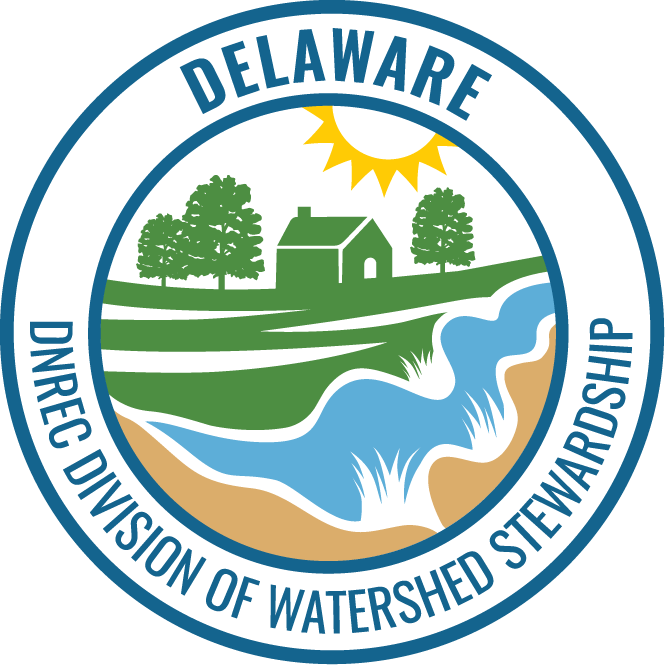
Facebook Twitter Instagram YouTube
Written on: December 9th, 2016 in Wetland Animals
By Kari St.Laurent, DNREC’s Delaware National Estuarine Research Reserve Fiddler crabs are one of the most iconic critters in the salt marsh. Male fiddler crabs have an unmistakable single large claw, paired with a tiny claw, which is used to court female fiddler crabs. But did you know that crabs start their life as microscopic […]
Written on: December 9th, 2016 in Education and Outreach
By Mary Rivera and Debra Forest, DNREC’s Division of Fish and Wildlife Aquatic Resources Education Center The quiet of a peaceful morning in the Woodland Beach saltmarsh is interrupted by a flock of 60 lively fifth grade students. Squeals of delight emanate from several of the children at the fish station where they get a […]
Written on: December 9th, 2016 in Wetland Assessments
By Katie Georger, Delaware Center for the Inland Bays In November, the Delaware Center for the Inland Bays (CIB) released the 2016 State of the Bays report, a 70-page compilation of environmental data about the Rehoboth, Indian River and Little Assawoman Bays and their watershed. In assembling this report, we considered thirty-five environmental indicators to […]
Written on: September 7th, 2016 in Wetland Assessments
By Brittany Haywood, DNREC’s Wetland Monitoring and Assessment Program Did you know that 50% of wetlands in our coastal plains ecoregion are in good condition? The U.S. Environmental Protection Agency (EPA) organized the National Wetland Condition Assessment (NWCA) in 2011 to get these data, and now our Program (Wetland Monitoring and Assessment Program) is again helping to assess more […]
Written on: September 7th, 2016 in Wetland Restoration
By Brittany Haywood, DNREC’s Wetland Monitoring and Assessment Program A hot topic for scientists and residents of Milton as of late, has been the Prime Hook National Wildlife Refuge Marsh Restoration project. This Refuge had multiple breaches in its freshwater impoundments where saltwater from the Delaware Bay cut its way through the dunes. The breaches […]
Written on: August 19th, 2016 in Wetland Assessments
People have been creators of some amazing inventions throughout history: wheels, cars, electricity, plastics and more! But what happens to these creations when they have outlived their use or are no longer wanted? You’re probably guessing that they end up in places like the dump, or antique stores or junk yards. But, would you believe […]
Written on: August 4th, 2016 in Wetland Assessments
By Tess Strayer, DNREC’s Wetland Monitoring and Assessment Program Summer 2016 Summer Seasonal Growing up, I spent the majority of my childhood outdoors with friends, family, and the occasional wild animal. Whether it was hiking, biking, fishing or playing we were constantly exploring, thus you would think my outdoor experience would help better prepare me […]
Written on: May 30th, 2016 in Wetland Animals
By Maggie Pletta, DNREC’s Delaware National Estuarine Research Reserve The Delaware Bay is home to the largest population of horseshoe crabs in the world, which is just one of the many reasons the Delaware Bay is so special. The horseshoe crab has been around since before the dinosaurs and is an important animal to the […]
Written on: March 14th, 2016 in Wetland Animals
BY Brittany Haywood, DNREC’s Wetland Monitoring and Assessment Program Thanks to all that extra water lying around, all sorts of amphibians start to come alive this time of year in Delaware. Frogs and salamanders use these seasonal pools of water, or wetlands, to breed and can only do so because predatory fish cannot survive the […]
Written on: March 14th, 2016 in Wetland Assessments
By Brittany Haywood, DNREC’s Wetland Monitoring and Assessment Program In the summer of 2012, DNREC’s Wetland Monitoring & Assessment Program rated the health of wetlands in the Mispillion and Cedar Creek River Watershed’s tidal and non-tidal flat and riverine wetlands. The goal of this project was to summarize recent gains and losses in wetland acreage, […]